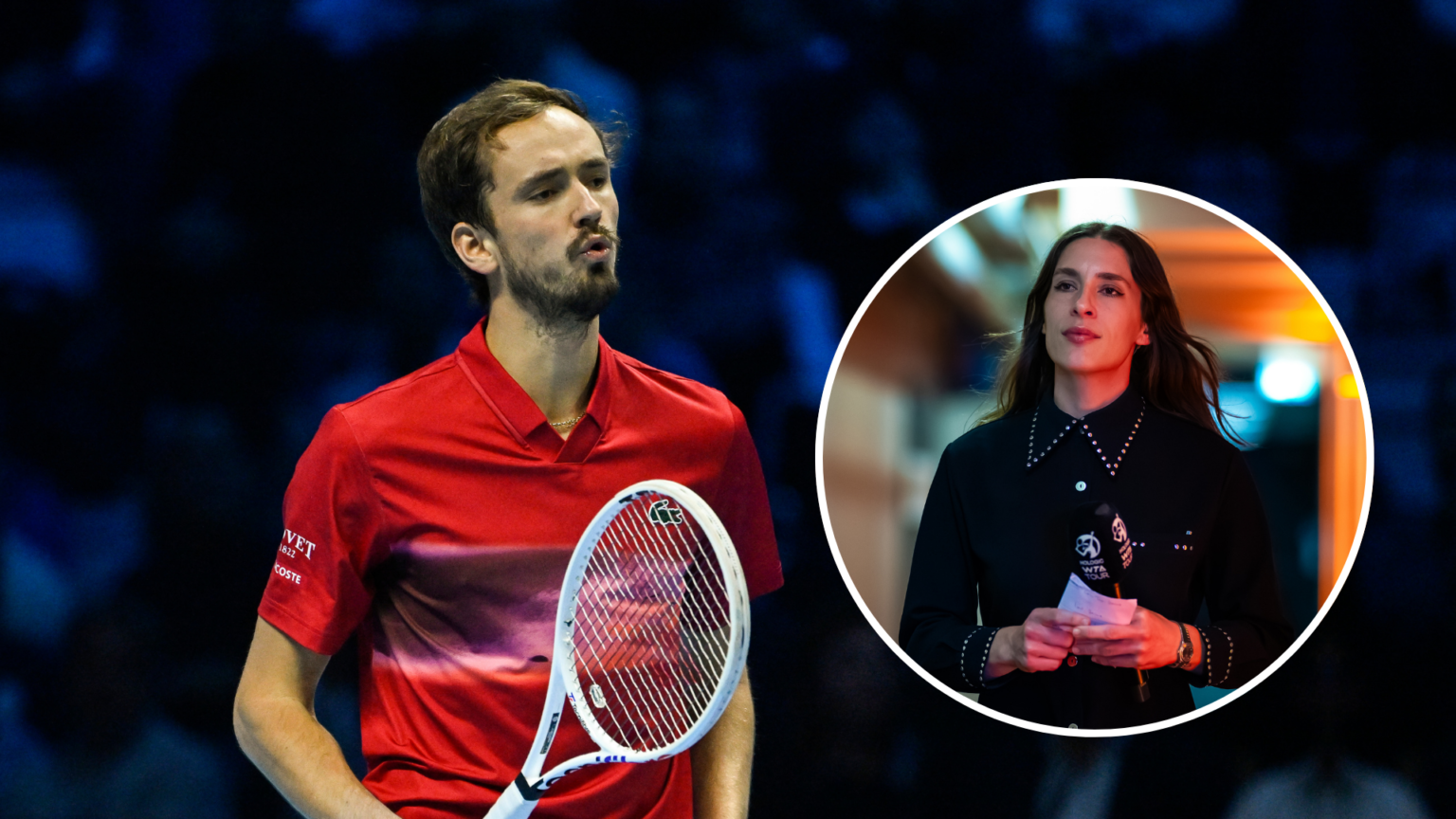
Andrea Petkovic, a former top tennis player turned analyst, has shared intriguing insights about Daniil Medvedev, claiming to have identified a “secret problem” that might be affecting the Russian star’s game. Medvedev, a former world No. 1 and one of the most consistent players in recent years, has faced ups and downs that have left fans and analysts speculating about what could be holding him back from reclaiming his dominant form. According to Petkovic, this elusive issue might be a key factor that’s quietly undermining his performance on the court.
Petkovic’s observation comes at a time when Medvedev is trying to regain the magic that saw him win the 2021 US Open and challenge the sport’s greats, including Novak Djokovic and Rafael Nadal. Despite his undeniable talent and unique playing style, Medvedev has struggled to maintain the same level of dominance in recent tournaments. While his game is still solid, Petkovic believes there’s an underlying factor disrupting his rhythm and confidence.
The “secret problem,” as Petkovic calls it, centers on Medvedev’s footwork and court positioning, which have been slightly off compared to his peak form. Medvedev is renowned for his unorthodox style, characterized by deep positioning behind the baseline, flat groundstrokes, and an almost impenetrable defensive game. However, Petkovic argues that subtle changes in his movement and positioning are preventing him from executing his game plan as effectively as before.
Medvedev’s court positioning has always been unconventional, often standing several feet behind the baseline to absorb his opponent’s power and redirect it with precision. While this approach has brought him great success, it also requires exceptional movement to cover the court and transition effectively from defense to offense. Petkovic suggests that Medvedev’s current struggles may stem from a slight decline in the fluidity and sharpness of his movement, which is causing him to mistime shots and lose control during crucial points.
Footwork, a fundamental yet often overlooked aspect of tennis, plays a pivotal role in Medvedev’s game. Petkovic noted that even a small lapse in this area can have a cascading effect, disrupting his ability to position himself for optimal shot execution. This issue might explain why Medvedev has occasionally appeared unsettled during matches, making uncharacteristic errors and struggling to impose his rhythm against aggressive opponents.
Another element Petkovic highlighted is Medvedev’s ability—or lack thereof—to adapt his positioning based on different opponents and surfaces. While his deep baseline stance works well against power hitters on hard courts, it can be less effective on faster surfaces or against players who employ drop shots and angles to exploit his positioning. Petkovic believes Medvedev could benefit from incorporating more variety into his game, adjusting his court position to counter different playing styles more effectively.
Mental factors may also be playing a role in Medvedev’s current struggles. Known for his fiery on-court demeanor, Medvedev has often turned to his emotions as a source of motivation. However, this intensity can sometimes work against him, especially when he’s not playing at his best. Petkovic speculates that the frustration stemming from his recent performances might be contributing to his inability to make the necessary adjustments mid-match.
Adding to the challenge is the level of competition on the ATP Tour. Medvedev is competing in an era where young players like Carlos Alcaraz and Jannik Sinner are emerging as formidable threats, while veterans like Novak Djokovic continue to dominate. This increased competition has forced every player to adapt and improve, leaving little room for error. Petkovic believes Medvedev needs to address these challenges head-on to remain a contender at the highest level.
To overcome these obstacles, Medvedev may need to focus on refining specific aspects of his game. Working on his footwork and agility could help him regain the sharpness that once made him a nightmare for opponents. Additionally, incorporating more aggressive court positioning could allow him to take control of rallies earlier and put pressure on his opponents. This adaptability might be the key to breaking through tough matches and regaining his confidence.
Petkovic’s insights also raise questions about Medvedev’s long-term strategy. While his defensive style has brought him immense success, tennis is an ever-evolving sport, and even the best players must adapt to stay ahead. Medvedev’s ability to evolve his game, addressing both technical and mental aspects, will likely determine whether he can recapture his best form and add more Grand Slam titles to his resume.
The upcoming Australian Open presents a golden opportunity for Medvedev to turn things around. The hard courts of Melbourne Park have been a happy hunting ground for him in the past, and he has the tools to make another deep run. However, as Petkovic’s analysis suggests, success will depend on whether he can address the subtle yet significant issues that are currently holding him back.
Medvedev’s unique personality and playing style have made him one of the most fascinating figures in tennis, and his journey to rediscover his peak form will undoubtedly captivate fans. Whether he takes Petkovic’s observations to heart or finds his own solutions, one thing is certain: Daniil Medvedev has the talent, determination, and experience to bounce back stronger than ever.
As the tennis world watches closely, Medvedev’s response to these challenges could define not only his season but also his legacy in the sport. For now, the focus will be on whether he can sort out the “secret problem” Petkovic has identified and use it as a stepping stone to greater success.
Leave a Reply